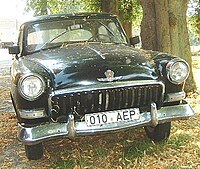Black Volga
This article needs additional citations for verification. (February 2010) |

Black Volga (Polish: czarna wołga) refers to an urban legend widespread in the People's Republic of Poland, mainly in the 1960s and 1970s.[1][2][3][4] It was about a black Volga limousine (with white wheel rims, white curtains or other white elements) that was allegedly used to abduct people, especially children. According to different versions, it was driven by priests, nuns, Jews, vampires, satanists or Satan himself. The driver would ask passers-by for the time and kill them when they approached the car to answer (in another version of the legend, they died at the same time a day later). Children were kidnapped to use their blood as a cure for rich Germans suffering from leukemia; other variants used organ theft as the motive, combining it with another famous legend about kidney theft by the KGB. The legend surfaced again in the late 20th century, with a BMW or Mercedes car taking the Volga's place, sometimes depicted with horns instead of wing mirrors.
It is suspected that the legend has been deliberately spread by the Ministry of Public Security of Poland to discredit tales of actual kidnappings by the state.[citation needed][who?]
See also
References
- ^ "Czarna wołga i inne legendy miejskie". serwisy.gazeta.pl (Gazeta Wyborcza). Retrieved 2009-06-01.
- ^ "Czarna wołga w hipermarkecie". wiadomosci.gazeta.pl (Gazeta Wyborcza). Retrieved 2009-06-01.
- ^ "Czarna wołga ma 50 lat". dziennik.pl (Dziennik). Retrieved 2009-06-01.
- ^ "Miejskie legendy". wiadomosci.polska.pl. Retrieved 2009-06-01.
Further reading
- Dionizjusz Czubala, Współczesne Legendy Miejskie [Contemporary urban legends], Ph.D. thesis, Uniwersytet Sląski, Katowice, 1993, ISBN 83-226-0504-8
- Piotr Gajdziński, Imperium plotki [The empire of rumours], Prószyński i S-ka, Warszawa, 2000, pp. 197–200
